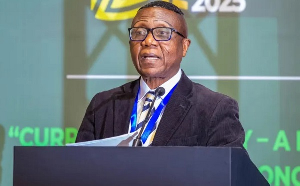Tamale, Sept. 24, GNA - Mr. Ernest Debrah, Northern Regional Minister on Wednesday bemoaned the poor feeder road network in the region, saying available statistics show that out of a total of 5,897 kilometres of feeder roads in the area, only 2,125 kilometres constitute engineered roads.
He said: "It is also significant to note that the total length of feeder roads in the Northern Region represent barely 18.10 per cent of the total length of the 32,600 kilometres of feeder roads in the country".
Mr Debrah who was speaking at a two-day "Fourth Zonal Rural Travel and Transport (RTTP) Workshop" in Tamale, said "the vital nature of feeder roads in the Northern, Upper East and Upper West Regions calls for a comprehensive programme of action to have a substantial proportion of our feeder road network engineered and paved".
The Ministry of Roads and Transport and the Department of Feeder Roads, in collaboration with the World Bank, organised the workshop for stakeholders drawn from the Northern, Upper East and Upper West Regions, in the travel and transport industry.
The workshop, which is the last in the series organised nation-wide, is to provide a platform for participants to discuss issues affecting the overall rural transport sector and to present policy recommendations that would address problems associated with the provision of road infrastructure and transport services in rural communities.
Mr Debrah said considering the importance of feeder roads in the country with its large population and agriculture-base economy, the total length of 32,6000 kilometres of feeder roads were inadequate. "There is the urgent and compelling need to increase our network of feeder roads at both regional and national levels as a means of stimulating rural development and reducing poverty".
The Minister said policies and strategies aimed at achieving quality improvement and assurance in the rural communication industry must simultaneously address the current inadequate stock of feeder roads in the country.
He said: "Until quite recently in our history as a country, feeder roads had remained the poor, pathetic and almost neglected in relation to trunk roads or our highways.
"Feeder roads had become synonymous with rural roads, which were generally perceived as relatively unimportant".
Mr Debrah noted however that if a road construction programme in the country, where rural development constitutes a vital component of the development agenda is assessed by its relevance, "one may find that feeder roads construction and maintenance are no less important than trunk roads".
He said: "The time has come for us to veer away from stereotyped programme concepts and definitions, which are not problem-specific and which also tend to limit our capacity for dealing with our peculiar local problems.
"I trust that our development partners would prove quite understanding and give us their maximum support in our efforts to fashion out rural transport policies and strategies that address our peculiar local conditions and which are in keeping with our national development agenda".
Mr Debrah expressed gratitude to the Ministry of Roads and Transport for the efforts it is making to tar the roads linking the district capitals to the regional capital.
He said: "I am happy that Yendi-Bimbilla, Yendi-Tamale, Tamale-Tolon, Yendi-Gushiegu and Tamale-Gushiegu are on the drawing boards of the sector Ministry and are receiving serious attention by the government"
In an opening address read for him, Dr Richard Anane, the sector Minister explained that the RTTP is a component of the sub-Saharan Africa Transport Policy Programme that has been launched by the UN Economic Commission for Africa, the World Bank and other development partners.
He said the programme is therefore, a multi-donor initiative, which provides a collaborative framework for assisting African countries to improve upon accessibility to transport in the rural areas and thereby enhance the quality of life of the people.
Dr Anane noted that the incidence of poverty is very high in the three Northern Regions owing to remoteness, geographical and physical constraints, as well as social exclusion of people from the main centres of socio-economic activities serviced by good road network.
He said the construction of culverts, bridges and the spot improvement of sections of roads would help reduce this poverty and bring comfort to the deprived communities, adding, "no doubt, the problem of poor road infrastructure is the root cause of poverty, illiteracy, disease, ignorance and marginalisation of our rural population".
The Minister said it is in recognition of the crucial role that road infrastructure and transport services play in alleviating poverty and enhancing socio-economic development that for this year, the government has decided to allocate 80 billion cedis from the HIPC Fund to support the development and maintenance of feeder roads.
In addition, he said, a total of 470 billion cedis from the budget, development partners and the Road Fund, has been earmarked for the Department of Feeder Roads to carry out its activities for the year.
Mr Martin Mensah, the Director of Department of Feeder Roads said the organizers of the workshop invited the stakeholders to participate in the drafting of national rural travel and transport policies and strategies for the country.
He said for its commitment to decentralization and rural development, as well as the consistent promotion of private sector involvement in using small-scale labour/capital intensive contractors made it possible for the country to qualify for membership of the RTTP in February 1999. In a brief statement, Mr Sahanun Mogtari, Upper West Regional Minister said his region is deprived and predominantly rural. The road network is inadequate and the existing ones are quite poor.
"Indeed, when we talk of length of tarred roads, the Upper West Region is comparable to none, with its less than 10 per cent of tarred roads", he said, adding, "it is the only region that is not linked to any other region in Ghana by tarred roads".
Mr Mogtari said: "it is therefore, our expectation that the road network in our region will be expanded and improved to facilitate movement and trade, thereby enhancing opportunity for our people to reduce poverty".
He said, he also expects that the region would be linked to neighbouring Burkina Faso to promote trade between Ghana and that country.
Regional News of Wednesday, 24 September 2003
Source: GNA
Minister bemoans poor feeder road network in Northern Region
Entertainment











